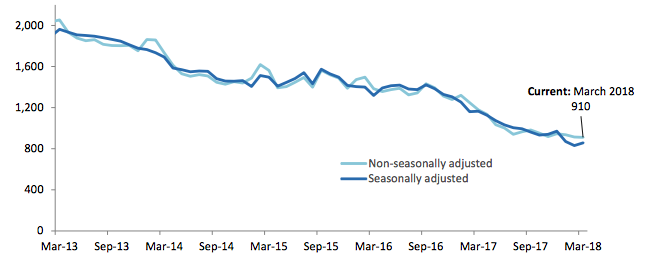

Figures released by Statistics Jersey show the number of people actively seeking work in March fell by 110 since December and by 310 compared to last year.
It follows the publication of the labour market statistics for 2017 which showed that total employment hit a record high for the month December, with 59,950 positions filled.
On 31 March, there were 910 people registered as actively seeking work (ASW). This total is 40 lower than the previous quarter and 270 lower than in March 2017. There were slightly more women (500) registered as ASW than men (410).
The total number of long-term ASW (registered for more than twelve months) decreased by 60 since last year, reaching 210 at the end of March.

Pictured: The evolution of the number of individuals registered as Actively Seeking Work (ASW) between March 2013 and March 2018. (Statistics Unit)
According to Shelley Kendrick, Managing Director at Kendrick Rose, this follows a pattern of declining numbers of unemployed people in Jersey with the number of people registered as out of work dropping significantly over the past five years, according to the figures.
She said: “The latest figures echo a trend we are seeing in recruitment where there are fewer candidates available for jobs advertised. The problem is worse for jobs which require specific skills, such as with many roles in Finance. The problem is particularly marked in Finance because this is an area of the economy that is seeing enhanced growth. However, when one sector of the economy grows, it draws talent from other sectors, leaving areas that can't offer enhanced salaries and benefits struggling for talent too.
“The number of people actively seeking work in Jersey has been dropping steadily over the past five years showing the strength of the jobs market. Clearly there are many areas where there is a specific skills shortage, and while retraining and upskilling may help to a certain degree, it will never fully address the gap between the jobs available and some of the candidates looking for work.”

Pictured: Shelley Kendrick of Kendrick Rose.
A survey by Jersey Chamber of Commerce recently found 70% of Jersey Chamber members are recruiting, and while most roles are filled within a couple of months, 45% of firms take three to 12 months to hire new staff, and 10% take over a year. 84% cite the lack of available candidates as the main issue.
Ms Kendrick added: “Recruitment is one of the biggest issues for businesses in Jersey. Many firms are struggling to find the right staff to fill available roles. This is both due to a general lack of available candidates and a shortage of candidates with specific skills. As recruitment specialists, we are well placed to address the issues by helping firms get their roles in front of good candidates at an earlier stage in the process. However, it's a tough market and in the short term, lack of good candidates is likely to remain an issue.”
The latest Labour market report also showed that the total employment was 1,310 higher than in December 2016, representing an annual increase of 2.2%. Employment increased across all sectors. Notable increases were seen in private education, health and other services where employment was up by 470, as well as in miscellaneous businesses activities which increased by 190.
Total employment in Jersey in Dec 17 was 1,310 higher than in Dec 16 pic.twitter.com/5Rj1QxRWMr
— Statistics Jersey (@JsyStats) April 10, 2018
Employment in the finance sector increased by 230 over 2017, with total employment hitting a nine-year high. There were 50 fewer people working in the banking sector compared to the same time last year, but the number of jobs in trust and company administration reached the highest level to date for that particular sector.
For Geoff Cook, CEO, Jersey Finance, the sustained growth in finance sector jobs reflects confidence in Jersey as a jurisdiction.
He commented: “These are clearly good figures for the finance industry and reflect the fact that there is strong demand for the kind of high quality expertise, knowledge and service firms here offer. That offers confidence to the international market that Jersey is a forward-thinking centre, but it’s also positive for the local community. The industry accounts for more than a fifth (22%) of total employment in Jersey, whilst, as our ‘Working Together for a Better Future’ document shows, for every ten jobs created in the finance industry, an equal amount are created elsewhere in the community."

Pictured: Geoff Cook, CEO, Jersey Finance.
He added: “These figures chime with the feedback we’ve had from industry - a recent survey of firms forecast that 800 jobs will be created in the industry over the next five years, 83% being filled by local people. Looking forward, it is vital that we place a real focus on the training and skills required to fill these opportunities. The way our industry will stay afloat is through the skills and expertise of our young islanders, with 3,000 finding their first jobs in finance over the last decade. By allowing continued access to the best talent, be it home-grown or sourced off-island, we can ensure that the Jersey economy continues to grow in order to support our aging population.”
Comments
Comments on this story express the views of the commentator only, not Bailiwick Publishing. We are unable to guarantee the accuracy of any of those comments.